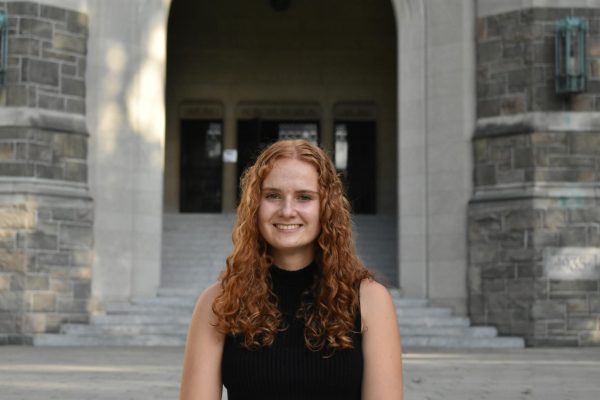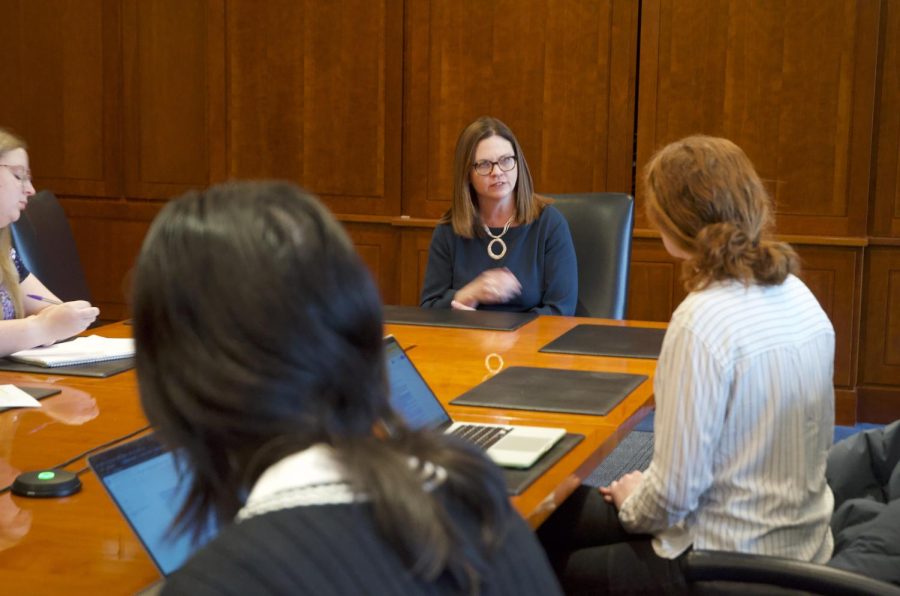President Tetlow Meets with Student Press
On March 1, members of the student press met with President Tania Tetlow to discuss her tenure as president. In the meeting, Tetlow touched on current unionization efforts, tuition increases, diversity initiatives, admissions and integration into the Fordham community.
Tetlow addressed Fordham and many other higher education institutions’ ongoing tuition increases. Tetlow said that the university will be raising tuition for the upcoming academic year.
However, the degree to which it will be raised is unknown. According to Tetlow, an increase addresses ongoing inflation and rising prices.
“We skipped a year in tuition increases at Fordham during COVID, for obvious reasons, but our costs still went up that year, so it created — we kind of got forever behind trying to sustain ourselves because we had a year without tuition increases. The inflation that is hitting all of you and your families as a kick in the shin is hitting the university as well. And so, there are costs that go up like utilities.”
Tetlow said that she knows the strains the increased tuition places on many students and their families.
She said she is working on cutting down on “waste” and “inefficiencies” to help save money.
“I am working really hard with how we bend the cost curve, how we find ways to be more efficient and frugal. How we constantly remind ourselves that every penny we spend at this university represents the life savings of your families. And that we have such incredible caution and carefulness about how we use money.”
Tetlow said that the university holds back “tens of millions of dollars” every time tuition is raised to try and help students who can not accommodate the increases. Tetlow’s tenure at Fordham has been marked by three prominent unionization efforts and negotiations: Fordham Faculty Union, Fordham Graduate School Workers Union and the Fordham Resident Assistants Union. Tetlow said the push for unionization and higher wages stresses the university’s finances.
“We are trying to sustain ourselves, and we are trying against all odds and often failing to keep your education as affordable as we possibly can. And so, it is not true that we can run the university with the goal of maximizing the wages with the people who work here without that really penalizing you, the students, who provide about 90% of the revenue for Fordham University.”
In the same light, Tetlow also mentioned the need to stretch university financial resources to plan for future generations.
“We are not going — the endowment that supports and sustains the university for generations to come — if we took it all and spent it on those of us here at this moment and shut down the university that would not be planting the tree for the future generations. We are — we play a very long game in universities.”
In terms of unionization processes, Tetlow said that she supports university members in voicing their needs; however, she said she wants people to work with her before assuming that she won’t be able to help.
“I do wish people would give me a chance and come to me to solve a problem before being certain that I would tell them no. That’s not who I am, and boy are things quicker and more efficient if you just come and ask instead of being sure that it won’t help, and I can’t solve every problem, but my instinct is to try very hard.”
Tetlow also addressed Fordham’s Rose Hill campus’s presence in the Bronx and the social and economic impact the university has on the Bronx community. She said she was impressed with Fordham programs like Urban Plunge and the Collegiate Science and Technology Entry Program’s (CSTEP) engagement with the Bronx. Tetlow also said that the university is seeking to source supplies and resources from the surrounding community to try and leave a positive economic footprint.
In addition, the university purchases many supplies for everyday functions and said she is looking for ways to implement ways to start procuring these supplies from smaller businesses, specifically those that are minority and women-owned.
“Universities are anchor institutions. They create their own economic activity, but also educational opportunity, research and innovation that also fuels industry, so it’s much easier to attract other kinds of businesses and companies to the Bronx because you can point to Fordham and other institutions here.”
Tetlow also addressed the ongoing conversation regarding university health centers being prohibited from offering and distributing contraceptives.
“We are a Catholic institution, and this is a strong and absolute doctrine of the church. I am happy to tell you publicly that it is one I disagree with, along with about 99% of American Catholics, and I hope the church changes its mind. In the meantime, we are bound by it, not by funding but by our identity, and it would be more of an issue if we weren’t smack in the middle of the city, where that access is not hard to get to. If we were in a rural campus far from the nearest pharmacy or health center, this would be an even more difficult question, but that’s where we are.”
Tetlow came to Fordham after a presidency at Loyola University New Orleans. She said that Loyola was a much more economically diverse university than Fordham, meaning that they often had to be “creative” when it came to creating efficient budgeting and spending plans. According to Tetlow, she took a lot away from that experience.
“There are ways sometimes where we only look at aspirational institutions and think, ‘oh, if only we had more, then we could do what we want,’ but actually the schools that make do with less are so much more creative and inspiring in their way of what they come up with because they must, and I think we have a lot to learn there too.”
She said that moving to New York has been a shift for her and her entire family, and she has been spending the last few months getting to know the Fordham community. Tetlow said she hopes to continue to listen to the Fordham community and meet everyone in it. She said that her family has come to enjoy New York, including her dog, Archie.
“It was asking a lot of them to uproot them, so I’ve been very grateful for their sense of adventure and willingness to take it on.”
Moving forward, Tetlow said she wants to continue to work with students, faculty and the wider Fordham community. In a message to students, she said:
“I am going to try my very best to do right by all of you. That this job is such a labor of love for me because of the students, and I really want to partner with you and with the work of finding ways that Fordham can constantly do better.”
Sebastian Diaz and Emma Kim contributed to this report.

Isabel Danzis is a senior from Bethesda, Md. She is double majoring in journalism and digital technologies and emerging media. The Ram has been a very...










































































































































































































